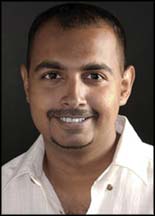Much to ponder over
by Sajitha PREMATUNGE
Anyone who consider themselves a patriot would have second thoughts
about acknowledging the originality of the play. As have I. Upon first
reading, it could strike one as an 'unpatriotic play'. This is
especially ironical for a play that attempts to define a patriot. So why
this interview? Because stripped of its political ideology, the play
certainly deserves the Gratiaen it received in 2005. Whatever political
ideologies one may harbour Thicker than blood by Delon Weerasinghe is a
play that should be appreciated for its portray of real people in
difficult situations, faced with difficult decisions.
 Delon Weerasinghe went to S. Thomas' College, Mount Lavinia and has
written professionally for stage, print, screen, web as well as radio.
He has written commissioned work for The Royal Court Theatre in London
and BBC World Service Radio. Although he is best known as a playwright,
he is also a director, fixer and a film maker his high calibre clients
include BBC, NBC, CBS, ITV and Channel 4. He wrote and directed his
first short film "Hide & Seek" in 2003. He has contributed to local as
well as international print media over the years. He claims he never
expected the Gratiaen. There were 56 entries that year, the most ever.
Due to unavoidable circumstances he could not read the play at the short
listing ceremony. "There was very little focus on the Gratiaen. Even
towards the very end. I didn't even have my speech ready. He claimed
that the Gratiaen was sort of validation of his work. Delon Weerasinghe went to S. Thomas' College, Mount Lavinia and has
written professionally for stage, print, screen, web as well as radio.
He has written commissioned work for The Royal Court Theatre in London
and BBC World Service Radio. Although he is best known as a playwright,
he is also a director, fixer and a film maker his high calibre clients
include BBC, NBC, CBS, ITV and Channel 4. He wrote and directed his
first short film "Hide & Seek" in 2003. He has contributed to local as
well as international print media over the years. He claims he never
expected the Gratiaen. There were 56 entries that year, the most ever.
Due to unavoidable circumstances he could not read the play at the short
listing ceremony. "There was very little focus on the Gratiaen. Even
towards the very end. I didn't even have my speech ready. He claimed
that the Gratiaen was sort of validation of his work.
Too strong
Although he claims that this is the only play he has written to
completion. Thicker than blood was originally a play for school. "It was
considered too strong for a school performance" he says. It was
originally a two-scene play between an old man and a soldier, which he
then sent to a competition held by the British council. He ended up not
only winning the competition but also a scholarship to Bangalore. "I was
more interested in the other play but I sent for the competition, but
they were more interested in this particular play and thought I should
work on it. The Royal Court Theatre provided me with a director and five
actors. The fact that you have a director and five actors made a huge
difference."
Going back to my initial displeasure at reading the play I could not
help but ask him whether the play reflected his own opinions. In answer
he claimed that it is almost impossible to write something that doesn't
comes from within. But said that his opinions of war have undergone a
great deal of change since he wrote the play.
The play was written over such a long period of time that his
opinions changed along the way. For instance, he explained that he wrote
the scenes between the old man and the soldier when he was just 16.
"That's why they depict the naivete of a 16 year old." The family scenes
are more mature. So it does not necessarily reflect his own opinions.
"However I believe that one who accepts everything without questioning
is not a patriot but an idiot."
In spite of the grim subjects he deals with Delon always manages to
squeeze in a bit of humour. He believes that humour is very important
for whatever genre, specially in drama. "When you look around, you have
to be either totally frustrated or amused. Although in some cases there
is nothing funny about it, there is humour in it the way you look at
it." It's how you make drama watchable, he explained.
Cynicism
But the most prominent element that runs through out the play is the
apparent cynicism of the playwright. However Delon explained that his
cynicism made the characters unrealistic nobody would like it. But if he
made it plausible it just reflects the way someone looks at a certain
situation. "Cynicism is suspicion at regarding some situation, it should
be realistic."
But despite his cynicism he seems to have much respect for the
soldier. "It's definitely tough to be a soldier. Decisions are made for
them that's why their morals were down." But he believes that mistakes
have been learnt from. "This is being done now, but it could have been
done earlier."
However he claims that war and politics is not at all what Thicker
than blood is about. It's about personal choices, personal integrity,
patriotism and sometimes strained relationships in a time of war. It
also deals with a number of issues and emotions, such as sexuality and
estrangement. A lot of things are left unsaid in the play, but a lot is
left for the reader or the watcher - for that matter - to ponder over.
|

